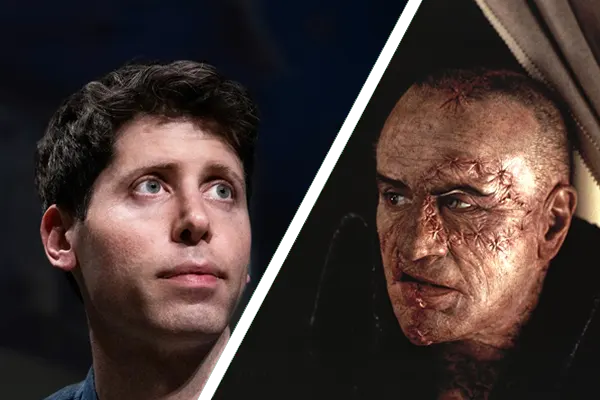This post was going in a different direction until last week’s OpenAI news. It was going to be a cute analogy where ChatGPT is the child prodigy, Sam Altman and the coders at OpenAI are the hockey parents expecting their kid to go to The Show, and generative AI’s international network of minimum-wage human trainers [3] are the prodigy’s elementary school teachers. Okay, maybe not so cute.
But OpenAI news came fast and curious: Sam Altman’s firing from OpenAI, his hiring by Microsoft, the OpenAI employee revolt, the dissolution and reformation OpenAI’s board of directors and Sam Altman’s return to OpenAI. All in one week. Only insiders know what really happened, leaving the rest of us to guess at what the implications might be.
No-So OpenAI
The problem appears to be a clash of OpenAI’s original guiding principles and new ones. The company started in 2015 as a not-for-profit research lab, with Altman as co-founder and CEO. Its mission was (and still is) “to ensure that artificial general intelligence benefits all of humanity.” When it became clear that the first major product, ChatGPT, was going to require huge amounts of computing power and that vast network of human trainers to launch, a for-profit company was set up to raise the necessary capital. It appears that Altman is CEO of two very similar companies with very different missions.
The key term in OpenAI’s mission statement is artificial general intelligence (AGI). ChatGPT is a large language model (LLM) also know as generative AI. It predicts the best answer to a question based on all existing data available to it and new training. Both provided by humans. So it’s hard to see how a LLM gets smarter than the smartest humans. ChatGPT was never going to eliminate mankind, unless we can be chatted to death. Most AI-scientists agree ChatGPT is not AGI [4]. The latter will come when algorithms are created that understand math and science and can learn on their own. Then it can (eventually) become more intelligent than humans in those subjects.
In the days before Altman’s ousting, there were cryptic public comments and insider rumours about recent breakthroughs in AGI research at OpenAI [5]. This is most likely what the original Board was referring to in their vague public statement that Altman was removed because he was “not consistently candid in his communications”. It appears that the Board erred on the side of caution with Altman and paid the price for it. And that hardly seems like an error, though it would seem The Economist might disagree (see quote below). Though not ideal, it’s far better that a handful with intimate knowledge of the people and technology decide democratically what’s best for the rest of mankind, rather than one individual.
Even if the directors did genuinely have humanity’s interest at heart, they risked seeing investors and employees flock to another firm that would charge ahead with the technology regardless. Nor is it entirely clear what qualifies a handful of private citizens to represent the interests of Earth’s remaining 7.9bn inhabitants.” – The Economist, Nov 22, 2023
Altman is on record as saying, “superhuman machine intelligence is probably the greatest threat to the continuous existence of humanity” [6]. Yet he appears to be moving to the ‘boom over doom’ end of the mission statement interpretation spectrum. He’s facing temptation on a scale few of us will ever have to deal with. There are billions to be made (for a few) if OpenAI can get AGI to market before anyone else. This is the cynical view of Altman’s motives. The naïve view is that only he/OpenAI can control AGI. I’m trying to remember where I last heard this viewpoint in the political arena…
The Bro Culture Issue
Many in the media see this as a corporate governance problem based on the immaturity of the original board and senior managers. But the people involved are very intelligent 30-somethings with multiple work experiences and families at home.
We see this as a corporate culture issue. Silicon Valley’s Bro Culture is not short on IQ but it’s clearly short on emotional intelligence. And it isn’t dead or neutered—look no further than the world’s richest man [7]. OpenAI’s new interim Board is more steeped in Bro Culture than the original. Gone are the women who voted Altman out. Also gone is the female interim CEO (she lasted a weekend), replaced by a brilliant bro who even insiders admit is not very socially or emotionally present.
The Modern Prometheus
Maybe there is a useful analogy here. It’s a shame to waste such an endearing literary device.
The original Frankenstein story was written by Mary Shelley in 1818. Its complete title is “Frankenstein or The Modern Prometheus [8]”. Many consider it to be the first novel of the science fiction genre.
In it, The Creature—that’s right, in the original, Frankenstein is The Creator—starts out intelligent and articulate. But he is not in control of his emotions. When he’s rejected because of his appearance, he kills innocents to extract revenge on his Creator and humans in general. All of which he ends up regretting. At the end of the book, Victor Frankenstein’s dying words are that we should all seek “happiness in tranquility and avoid ambition.” After which the despondent Creature drifts off on an Arctic ice flow and presumably dies shortly thereafter, miserable and alone. Not so much a horror movie, more of a Shakespearean tragedy.
And everyone started out with the best of intentions, including The Creature.
-
- Sam Altman image credit: Joel Saget / Getty Images. The Creature image credit: Robert Deniro from the 1994 movie Mary Shelley’s Frankenstein, ©TriStar Pictures, Inc, et al.
- Previous Marketing Wilderness posts on AI topic: AI: THE GOOD, THE BAD & THE UGLY, AI BRINGS LIFE TO CREATIVE, CHATBOTS JOIN THE CONVERSATION.
- This training issue came up at the beginning of this year, but no one seems particularly interested now. Here’s a good summary: Sarang Sharma: Sarang Sharma, “The Hidden Labor Behind Chat GPT’s Success”, LinkedIn, August 12, 2023.
- Will Knight, “Some Glimpse AGI in ChatGPT. Others Call It a Mirage.”, Wired.com, April 18, 2023.
- Unknown author(s), “With Sam Altman’s return, a shift in AI from idealism to pragmatism”< The Economist, November 23, 2023.
- Ian Brown, “The peril and promise of artificial intelligence”, The Globe and Mail, March 31, 2023.
- Depending on Tesla’s stock price, any given day.
- Prometheus was the mischievous Greek god who created man from clay (sounds vaguely familiar to retired Christians) and also gave man fire to play with. He was punished unmercifully by his Chairman of the Board, Zeus.





